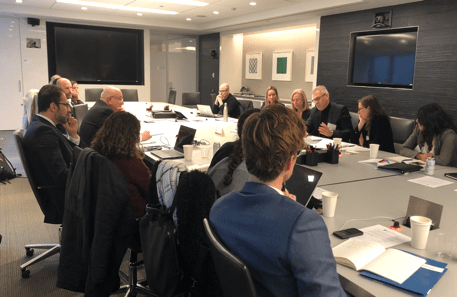By Julie Meier, MSGA ’19
 On March 1, 2019, approximately thirty representatives of U.N. Member States, civil society, academia, and the legal community met to discuss an initiative proposed by Professor Jennifer Trahan of NYU’s Center for Global Affairs. Professor Trahan has identified a number of “hard law” considerations relevant to use of the “veto” in situations of core international crimes – genocide, war crimes and crimes against humanity. The March 1 meeting was co-hosted and co-organized with the NGO Global Justice Center and the law firm of Foley Hoag LLP.
On March 1, 2019, approximately thirty representatives of U.N. Member States, civil society, academia, and the legal community met to discuss an initiative proposed by Professor Jennifer Trahan of NYU’s Center for Global Affairs. Professor Trahan has identified a number of “hard law” considerations relevant to use of the “veto” in situations of core international crimes – genocide, war crimes and crimes against humanity. The March 1 meeting was co-hosted and co-organized with the NGO Global Justice Center and the law firm of Foley Hoag LLP.
The circumstances in which the Permanent Members of the U.N. Security Council (P5) should be able to veto Council resolutions has increasingly been a concern to the international community. There are two important initiatives calling for voluntary veto restraint when the Security Council faces situations where atrocity crimes are being committed—the ACT Group of States’ Code of Conduct, and the “French/Mexican Initiative.” Professor Trahan’s initiative adds to this ongoing momentum through the following three legal arguments that were discussed at the March 1 meeting:
- The veto power derives from the UN Charter, which is subsidiary to jus cogens norms. Thus, a veto that violates jus cogens norms, or permits the continued violation of jus cogens norms, would be illegal or ultra vires.
- The veto power derives from the UN Charter, which states in Article 24(2) that the Security Council “[in] discharging [its] duties” “shall act in accordance with the Purposes and Principles of the United Nations.” A veto in the face of a draft resolution aimed at curtailing or alleviating the commission of genocide, crimes against humanity or war crimes does not accord with the Charter’s purposes and principles.
- A permanent member of the Security Council that utilizes the veto power also has other treaty obligations, such as those under the Genocide Convention, which contains an obligation to “prevent” genocide. A Permanent Member’s use of the veto that would enable genocide, or allow its continued commission, would violate that state’s legal obligation to “prevent” genocide. A similar argument can be made as to allowing the perpetration of at least certain war crimes, such as “grave breaches” and violations of Common Article 3 of the 1949 Geneva Conventions, given the obligation to “ensure” respect for the 1949 Geneva Conventions.
The March 1 meeting made for a productive discussion, and was an important step to socialize the ideas expressed in the initiative. It will further efforts towards ensuring that these legal  considerations become part of, and add to, the growing momentum towards UN Security Council veto use that does not permit atrocity crimes and which conforms to international law. One proposed idea is for States and civil society organizations that support the initiative to work to convince the General Assembly to request the International Court of Justice (ICJ) for an advisory opinion on the legality of unrestrained veto use while genocide, crimes against humanity and/or war crimes are occurring.
considerations become part of, and add to, the growing momentum towards UN Security Council veto use that does not permit atrocity crimes and which conforms to international law. One proposed idea is for States and civil society organizations that support the initiative to work to convince the General Assembly to request the International Court of Justice (ICJ) for an advisory opinion on the legality of unrestrained veto use while genocide, crimes against humanity and/or war crimes are occurring.
The initiative is already endorsed by a number of distinguished international legal experts (including Hans Corell, former Under-Secretary General for Legal Affairs; Richard Goldstone, former Prosecutor of the International Criminal Tribunal for the former Yugoslavia & the International Criminal Tribunal for Rwanda; and Navanethem (“Navi”) Pillay, former High Commissioner for Human Rights). It is also supported by several civil society organizations prominent in the area of international law, such as the Open Society Justice Initiative, the Global Justice Centre, the International Center for Transitional Justice, the Women’s Initiative for Gender Justice, Parliamentarians for Global Action, as well as the Global Centre for the Responsibility to Protect.
A next step in socializing the ideas of the initiative will be an event to be held at NYU’s Center for Global Affairs, 15 Barclay Street, on April 17, 2019, 6:30-8pm, entitled “Atrocity Crimes & The Veto Power,” featuring Ambassador Christian Wenaweser, Ambassador Juan Ramón de la Fuente Ramirez (TBC), the Deputy Director of the International Center for Transitional Justice, and Professor Jennifer Trahan, moderated by Andras Vamos-Goldman. Please click the event title to register.
